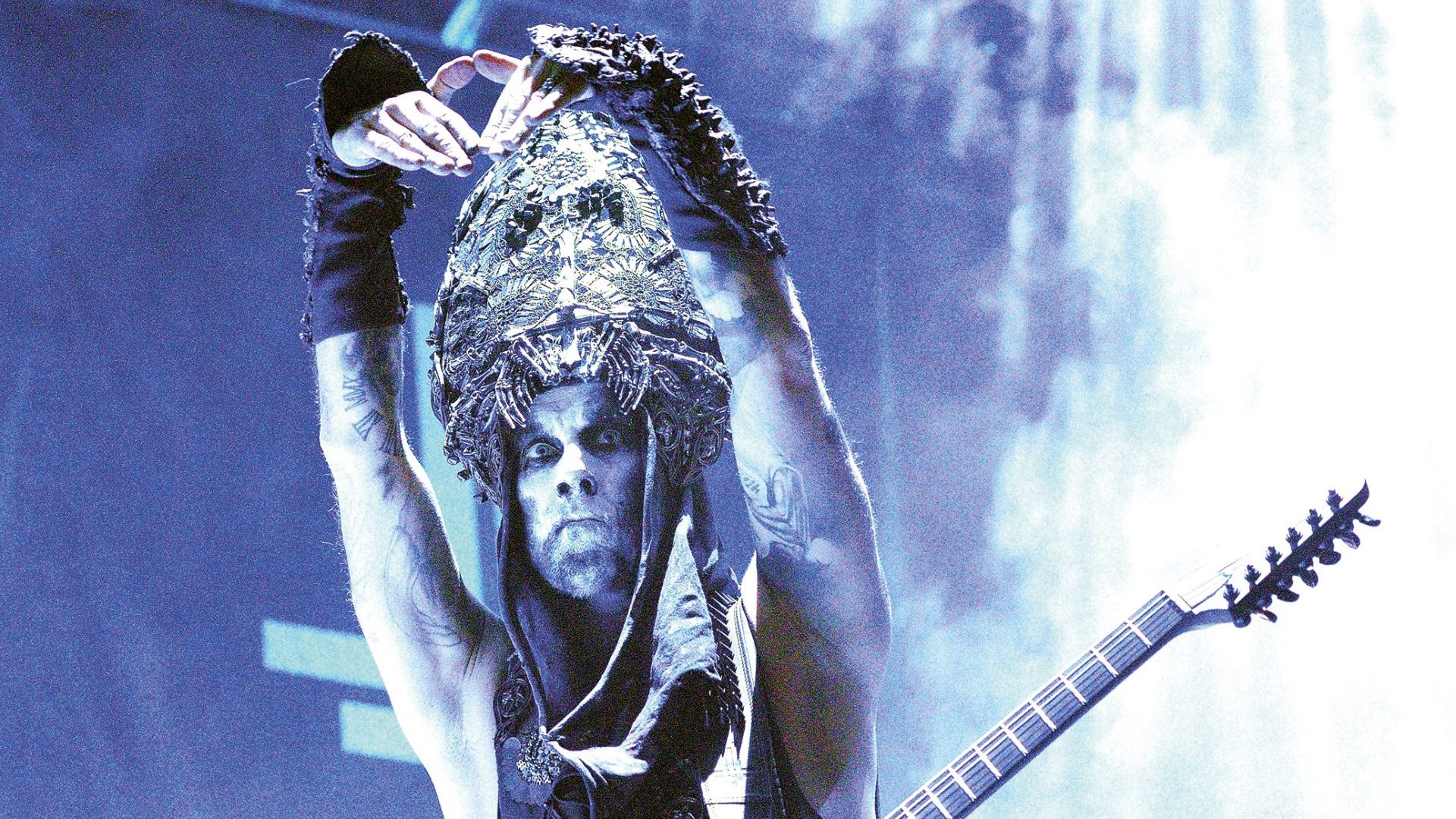While the culture wars continue to rage with force in the Anglophone world, it is nothing compared with the rows pulling Poland apart.
Battles between Catholic traditionalists and a generation with entirely new values are ongoing amid the right wing Law and Justice party’s erosion of LGBTQ rights, adoption of an almost complete ban on abortion in 2020 and, extraordinarily, prosecutors’ pursuit through the courts of some individuals on charges of blasphemy.
Article 196 of the Polish penal code threatens a possible two-year prison sentence for “whoever offends the religious feelings of other persons”, and increasing numbers of citizens are falling foul of the law.
One of those targeted is Adam Nergal Darski. Frontman of internationally successful blackened death metal band Behemoth, Darski is also a former judge on TV’s The Voice of Poland, a cancer survivor, a satanist and an entrepreneur.
With a theatrically satanic aesthetic, blast beats, doomy guitars and growled vocals, Behemoth rose from the Polish metal underground of the 1990s. In 2014 The Satanist, the comeback album after Darski’s leukaemia battle, went gold in Poland and reached No. 34 in the US album chart. Since 2008, he has also been accused in not one but four blasphemy cases, three of them ongoing.
But Darski is not taking the machinations of the state lying down. Alongside releasing the Behemoth live DVD and album In Absentia Dei in December, working on a new album and releasing the third instalment of his project Me and That Man in November, he is also fronting the Ordo Blasfemia campaign.
Protesting against the “nonsensical blasphemy laws made by tenuous politicians”, as he puts it, the campaign says Poland is lurching towards authoritarianism and theocracy as artistic freedom and freedom of speech become ever more restricted.
How Darski became one of Poland’s most fascinating contemporary figures is rooted in modern Polish history, and he has acknowledged that “I’ve experienced a clash of ages”.
He was a small child when the strike at the Gdańsk Lenin shipyard, where his father worked, broke out and gave birth to the Solidarność union, which started the downfall of communism in Poland. Raised a Catholic, he was
nevertheless aware that “there was an obvious discord between things that
hung on the walls and what we actually practised”, as he put it in his 2012 autobiography.
By the time of Darski’s first communion, his priorities were sufficiently fixed that he used the money given to him for the occasion to buy his first electric guitar.
Darski was still in his teens when Behemoth formed in 1991, just as a new Europe was being born. The band went on to international success at the same moment Poland opened up to the outside world, their breakthrough album, Demigod (2004), appearing the same year as the country’s accession to the EU. But many constituencies have been uncomfortable with the social
changes that have come with political change. In 2012, Darski drew his line in the sand in the culture wars by formally declaring himself an apostate in a church ceremony.
Darski’s apostasy came while he was fighting the first blasphemy case against him, brought for ripping up a Bible on stage in 2007. While the judge
ruled in 2011 that this was legitimate artistic expression, Darski’s presence on The Voice that year brought criticism from various figures in the Polish Catholic Church who threatened a licence-fee boycott in the event Darski remained on the programme. Damian Ukeje, whom he was mentoring, won the competition.
The following year, Darski’s ex-girlfriend, glamorous Polish pop superstar Doda, was fined for saying in an interview that the Bible had been written by weed-smoking drunks, and despite the innocent verdict in Darski’s case, prosecutors pursued him through the Court of Appeal and Polish Supreme Court until the case was finally exhausted in 2015.
Since then, Darski has been charged with further offences relating to a Behemoth T-shirt, possession of a wooden sculpture of Jesus crucified on a penis, and a picture on Facebook of him stepping on a portrait of the Virgin Mary.
Darski is not alone in being hounded in this way. In 2012, Jerzy Urban, editor of the satirical magazine NIE, was prosecuted for publishing a caricature of Jesus with “an unintelligent facial expression”. Although Urban was acquitted in 2020, the prosecutor-general is now trying to revive the case against the 88-year-old journalist.
The editor of the women’s supplement of liberal daily Gazeta Wyborcza has also been targeted for publishing an image of the Virgin Mary in a face mask adorned with a lightning bolt and holding a black umbrella, symbols of the pro-choice All-Poland Women’s Strike protests.
Ordo Blasfemia is raising money to fund the defence of such cases, as well as to pay for a billboard campaign demanding reform of the law featuring the slogan “Wolna sztuka w świeckim państwie” – “Free art in a secular state”.
Darski seems to enjoy being politically opaque, opposing the Polish Right while not distancing himself from the extreme-right elements of the metal scene, and he has never held back from conservative-baiting behaviour. But the strain of his court cases has no doubt been very real, and his commitment to changing the narrative in a country that is fast losing the plot stands as an example to all watching the radicalisation of their governments with horror.
ADAM NERGAL DARSKI IN 5 SONGS
Behemoth, Transylvanian Forest
(1995)
The opening track of the band’s debut EP showcases Behemoth’s original classic black metal sound.
Behemoth, Blow Your Trumpets
Gabriel (2013)
This brutal blackened death metal track was the first single from The Satanist (2014).
Behemoth, Ecclesia Diabolica
Catholica (2018)
From Behemoth’s most recent studio album, I Loved You At Your Darkest, demonstrates the album’s symphonic, operatic sound.
Me And That Man, Under the Spell
(2021)
Camped up gothic country track features vocals by ‘Mary Goore’, aka Tobias Forge from Swedish pantomime metal band Ghost.
Me and That Man, Angel of Light
(2021)
Thoroughly Lana Del Rey-ish, atmospheric affair features vocals from one-woman gothic folk act Myrkur, aka Danish model, singer and multi-instrumentalist Amalie Bruun.




